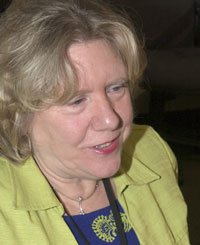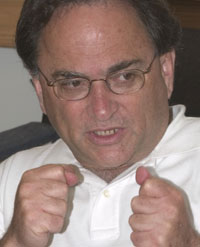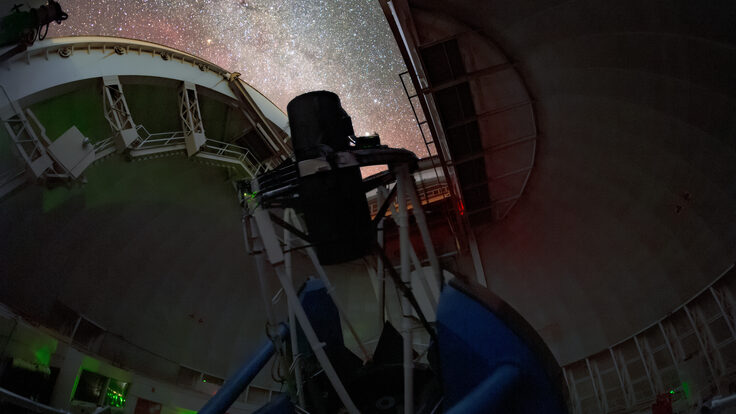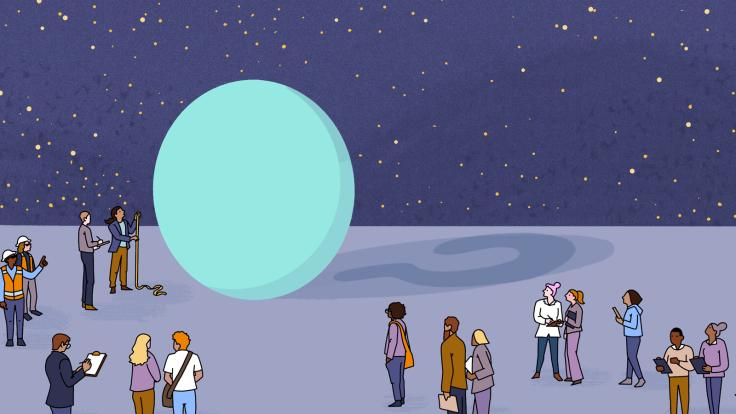The Grid
"Large scale networks of computing resources in the service of the most computationally intensive problems of the future" is one vision of the Grid, being developed by computer scientists and physicists around the globe. But what else is the Grid and how is it different from other ways of computing? What are its challenges and promises?
symmetry listened in as Vicky White, head of Fermilab's Computing Division, and Miron Livny, professor of Computer Sciences at the University of Wisconsin discussed Grid computing.
What is the Grid?
 Photos: Deborah Guzman Meyer/ Fermilab |
 |
VW: The literature says the Grid is a set of parallel computers and interconnected devices that are all heterogeneous but they are all going to look homogenous from a user's point of view. But I think the Grid is shorthand for a way of working together in which we actually exploit the synergies between things and share and cooperate, rather than just a physical infrastructure. It is a shorthand for us expressing this vision that we can all do better together by sharing and cooperating and leveraging off of the different interests that we have.
ML: I would say that for me the Grid is a concept, or if you want, a movement, rather than a system and I think that the term "The Grid" enables us to come together and start doing certain things in a certain way that is much more sociological or cultural within the scientific community than technical. But the technology is gaining strength now because of progress on the hardware side.
VW: I think there is another aspect to it though. Clearly for science, and especially high energy physics, the Grid has come to the fore at the moment out of a basic need. The problems are too large, the collaboration required to do Grid science is so broad and worldwide, and the amount of data is so huge that physically one can't attack the scientific problem without an enormous technological change. I think that the term "Grid" has taken hold because people have understood how to explain the vision in a simple way so that it has captured the imagination of people and tied it to their view of economic prosperity and how information technology is really the foundation of any organization moving forward.
How is the Grid related to the Web?
VW: I think the Web is a really important precursor because people have actually watched the progression of the Web from something scientists started off with as a way to share their documents and their information into a general way of sharing information that a lot of people could benefit from, into the very basics and the engine of all e-commerce that affects everybody's lives. I think it's extremely important to be able to sell to people a vision. And that is the salt of funding agencies: the ability to invest in this technology and invest in making this come together and that's why this has become so important to all of us because you can't do much of all of this without the funding behind you.
ML: So I think that the big question out there is, Will computing become an integral part of the life of every citizen in the same way that data is today?" The Web is a data delivery system and most citizens or most people don't use computing — they use the Web to book a ticket or to figure out a route from point A to point B, but it doesn't involve a complex simulation to pick the optimal route. Science is depending more and more on computing to make any kind of decision and I believe that this will become part of our daily lives so that we will ask computers to make decisions for us, by using simulations and solving models that affect our lives.
If the consumer wants to use the computer as a prediction tool, as a source of information for the future, if you want to figure out what is the best diet for the day given your cholesterol level in the morning, then you have to run a model. Then you're getting out from looking up a Web page to actually using the computing power to do something that will help you make a decision. I think that when we start using computers to make decisions, we are starting to really use computational power.
Is there a difference between the Grid and distributed computing?
ML: The physics community for a long time has been using Grids, even if they didn't call them Grids. ALEPH [an experiment at CERN] had a distributed system that we used to hook together the computing resources within the experiment — to use them, to share them. Companies, going back in the early 90s, had this kind of system, especially the hardware industry. At that time we saw a lot of this activity actually happening but it was local — maybe more ad hoc. It also happened in an era when distributed computing was a no-no. Everybody was doing parallel computing, building the big machines. I mean, parallel processing was the thing. Going out and getting funding for distributed computing in the early 90s was almost impossible. So I think that there is a lot of this technology that is already in place but it is not being called or not being viewed by the outside world as The Grid" because people are looking for something which is one well-defined thing out there. I personally don't think that will ever happen.
VW: You're more liberal than I am in saying these things are the Grid. I don't think they really meet my definition of the Grid. When people do distributed computing in a tightly controlled environment where they own all the computers and they expect them to be up most of the time, as they've done in the past, within companies, within an enterprise, that doesn't meet my definition of the Grid that I was trying to push forward, where an essential element of it is that people have to have decided to do some form of sharing and have some kind of economy that goes with this sharing as opposed to an internal economy within an enterprise.
ML: OK, now we're getting into the disagreement. I think that when you look at an enterprise, you assume it is homogeneous in terms of the ownership of the resource, which is not the case. As you know, if I am harassing you, "Why don't you have a Grid here at Fermi?" you will say, "OK, all the machines here are owned by Fermi." But still they're machines that are owned by or assigned to this department or that department and figuring out how much this department can use from this department under what circumstances...
VW: That's what we are doing — evaluating those resources...
ML: But this is within the same organization. When we started the Wisconsin Computer Science Department, we were all on the same floor but this was her machine and this was my machine, OK, so we owned them. Even if they were bought by the department, they said, you have priority over this machine because I think this machine is for your work so when you need it, it is at your disposal. So that is one thing. I disagree that within an organization you don't have all the issues of priority and ownership.
I think that the problems are there. Maybe the big difference is at the trust level. OK, so who are you? And can I get my hands on you and say some bad things about you because you misbehaved? It's changing as we are getting outside of the organization, but even there, when I have a student who is working for one professor and they misbehave, then I have to go to that professor. There is even a structure in this kind of group but things are getting more complicated when we go across organizations...
VW: Actually, I think we are in violent agreement, because what you have just described exists within an organization like the University of Wisconsin or the Fermilab site. We are having to work on this idea of federating our resources in order to come up with something that is of mutual benefit. We are having to work on these issues of trust, fairness, getting value out of doing this, being assured you can do this. I agree that it is a microcosm of working it out in the bigger world, so we are actually in agreement. But when people say we've been doing distributed computing forever, I don't believe they necessarily believe that they involve all those issues. They may have set up distributed computing but they have not had to go and negotiate that idea of trust and ownership and fair shares and things like that.
ML: So the question is, "What is a distributed system?" And if you go back to the definition that was going around in the 70s, one of the key aspects of a distributed system was local autonomy. That I own it, that I have priority over it, that I dictate what can and can't be done. Then there is the question "Is there the motivation for us to play together?" And I think this is what, for me, the principle of the Grid is - that each of us is both a potential consumer and potential contributor, but we are coming to it with the possibility of dual roles in the same way that we are doing it in a community. We got out of the caves to form a village for the same reason that I think we are building Grids today - because we realized that we are going to do better by sharing. I can give you computing and you can give me storage, but it's also true that you can give me interesting problems to work on as a physicist and I, as a computer scientist, can give you interesting solutions. So the give and take is not only at the level of the resources.
VW: But you're getting to one of the big strengths of these projects and why they're becoming very successful too. That is that they have been successful at bringing together computer scientists and physicists and bringing together different people from different sciences and starting to share their ideas and their solutions. And that is making us stronger. The fact that we are sitting here today having this discussion is a result of that kind of partnership, which has gone on over the last few years and which is fairly unprecedented, in fact. That's part of this whole environment of mutual benefit and federating things together in a way that everybody wins — that there's an economy that makes things win out, that makes everybody win out.
How critical is Grid security, based on our Web experiences?
ML: If you build a house and you put in a valuable picture, then you have a problem of protecting that. And you don't move to a mountain and disconnect yourself from society just to protect the picture that you have. I mean, we have police and we have prisons and we have various tools that we have developed over the years to live in a community. Obviously, by doing what we are doing we opened the opportunity for bad people to take advantage of that. But we use email because we take the benefit and we take the risk and we say we're willing to live with it. So yes, by sharing or building communities people can come into the communities and take advantage of the community. Saying that we're not increasing risk is not the right thing to say, because by opening it and allowing people to do more, there's always an additional risk. But I believe we're going to find a solution where the risks and the benefits are at a point where we feel comfortable.
VW: Yes, we should also discuss the other big challenges we're facing. What are the variables to success? In my mind there are four things: One, on the top of this there's security. Two, federations and governments: how you actually did come to the rules, to the idea of what was a federal offense, what was not being a good citizen, and how you learn to get agreements and enforce them across these boundaries. Three, the failure to show mutual benefit. If we could not demonstrate mutual benefit, that would be a failure. And, four, robustness issues.
Now, the bad guys, if there are any, feed into all four of those things. Because if there are bad people, they can wreck all of those metrics that I am talking about. They can break the security, make it unfair that they're taking out resources. It really is an extension, I think, of the mess we're facing with the Internet, with hackers getting in all the time. As you said, no one would think of turning off all email or the whole Internet.
I think you have to work on these issues technologically, with computer scientists, who have a great part to play. We're really at the beginning of security. And we're going to work on this federation, the sociological issues and how we together decide: How do we track down bad guys? What's the punishment? What are we going to do with them? What is an imprisonment equivalent of the violator in the Grid world? What do you do? We're not going to get the FBI on every single case. So it's part of the process of building this vision. And it's not easy. It's a challenge.
ML: I think that the concept of the Grid has a lot to do with sociology, and common benefit in changing the way we do science and hopefully the way that we live. But then, by definition it will build more opportunities for the bad people. And we'll have to deal with it with the same mechanism that we have now: we'll have to lock our cars, put more security on our homes. But we will have to also change the police and the laws, in order to deal with the people who break in, because there is no way to build something that is not breakable.
VW: The technology is what's hopefully going to help us. It always has. Just as it provides you with a two-edged sword, it can provide you with the mechanisms to help us. So identifications, retinal scans, or taking your thumbprintwe know how to do it now. It's just a question of cost, whether it's worthwhile, right?
Can the Grid achieve a true global outlook?
ML: If we look at the Grid in terms of federation, there are people that are talking about a Grid of one. My laptop is a Grid. My department is a Grid. My Fermilab is a Grid. And the state of Illinois is a Grid. If you look at structures such as the roads, the structure is local, and some people drive on the wrong side of the road, and when they cross the border they have to drive on the other side of the road. And they stick to it. I think that we are going to have different cultures and different approaches in the building blocks, and we'll find ways to federate them and to make them work together. The thing one has to be aware of is that, since we're talking about technology, technology is being viewed as an element in the economy of a country. Countries feel that if they are leading the Grid, they want to feel ownership of some of it to show that they are players. So because of the sociology you have to accept that, and you cannot say that the Grid technology is American, even if it were true. And you cannot say that all the Grid technology is IBM, or HP. Everyone wants to feel that they have an element in it. And I think that they will. At some point someone will make an innovation in one place, and then we'll have to move in that direction. Heterogeneity is in the foundation of everything that we are doing. It's cultural, it's political, it's economic, it's conceptual, and it will all move forward, I believe. So I think that the point that we have many Grids is a very straightforward conclusion.
VW: There are many levels on which you can discuss how different countries approach this. There is this motivational aspect of how they see this concept and this vision and they turn it into what is useful for their regime. So there're bound to be many Grids, and many different purposes for things, and I think it's absolutely key to build this idea of interoperability. I build my Grid, he builds his Grid, and somehow we work out how to interoperate. I think there's a lot said about standards, as if there is going to be one standard. I don't actually believe it's going to be one standard. I think there's going to be many agreements on architectures and services. Is there more to be gained by the German Grid and the French Grid working together as a European Grid or isn't there? And in physics we have pressing needs to interoperate together. We're working very closely in the US and moving outwards to work on the LHC computing grid. And the Europeans are doing a very similar thing - they are working on a European Grid, which is the center for LHC computing. The key to all of this is that all of these self-interests have to push together and interoperate. And one of the driving forces is the physics of the LHC, which actually demands that we have movement towards an interoperating economy.
The force of the LHC is so great that it could impose a picture of it all being homogeneous. But I think people have actually come to realize that by the very nature of the Grid that wouldn't work. Because if we had enough money to do all that and we had enough forces to just say, "Well, we will actually just work together to do exactly what we want to do," we probably wouldn't even have to go through the extremes we're going at to build this. It would come to a different, quieter kind of Grid computing. So I think this whole idea of federating and interoperating and building many standards — standards of operation, standards of detail — is essential.
ML: I believe more in common practice rather than standards. And the reason why people pick a common definition is because of self-interest. If they want to be compatible, they want to sell their product, they say that they follow this pattern. It's the same way of language: You don't advertise in Chinese if you want to sell in France. It's not a matter of standards, it's a matter of what is your self-interest.
What role does physics play?
ML: As an outsider, what I see valuable in the physics community is the sociology. In my opinion, physics is the most mature science in terms of large-scale collaboration. I don't think that there is any other science that's getting even close to it. And if the whole concept of the Grid is about building a community and sharing and figuring out how to work, we have to pool our resources together. We have to work in larger groups toward solving the problems that we are facing; we have to share. Then, physics is leading in the sociology, which I think is extremely important, because others can come together and try it out, and lead the rest of the community in building these large scale operations in which we share something to achieve a common goal. So if this is what the Grids are about, that's why I think physicists are playing the role that they are. I think biology is coming pretty fast to join this. Their problems are not as clearly defined as in physics, though. But sharing data, and bringing the community together, and figuring out what it means is all part of this. They are taking what I would call baby steps.
VW: I would say, we almost entirely agree. I believe physics has a very special role to play in the development of the Grid and is playing a very special role. I believe physics is leading in actually trying to build a real Grid. And it's because of its history of high energy physics, which has been a very large scale science for a long time. It plans what it needs to achieve years ahead to build detectors and to develop technology they haven't yet any idea how to make. Also, they are accustomed to taking those steps and turning a very difficult vision into a reality, and using worldwide resources to do it. They actually have at this time all the key ingredients to push this forward, to make this a success. And they're highly motivated to do so. They've also come to the realizationas the funding of science in this country has become more and more difficult, especially in high energy physics - that they have something to offer, and they need to talk to other sciences, and there are spin-offs.
ML: But this is still a challenge. And I think that the community is struggling with the concept that what they are doing has an impact beyond physics, and they have to devote resources to it, and attention. They must be realizing that, yes, we are living Grids, we are living this concept, and therefore our mission now goes broader than just finding the Higgs. Now our mission, in a much more direct way, is to enable biologists to cure cancer. Because we are ahead not in what we are using for our physics, but in what we are doing as a science that other sciences can follow. So it's a broader world. I think that because of the mission focus and all this, it's still a struggle for some of the people who look at it and say, "This is for my experiment, and anything that doesn't serve my experiment, I don't care about."
VW: And that's the thought that I'd really like to end on. I spend a lot of time talking to people to explain why Grids have this aspect to them, and why we aren't attuned to this broader view of how our science fits into the broader world of other sciences and the society, and that being narrow is not going to help us in the end. So I'd like to leave with the message that just as we have to embrace technology to do our science, we really have to embrace this concept of fitting into a bigger ecosystem, not just high energy physics. If we do that, I think we'll be successful. Our science will be better, and we will actually share with other people and have this impact on society, which I think everyone hopes and dreams for.
Click here to download a pdf of an abridged version of this article as appears in the print version of symmetry.






